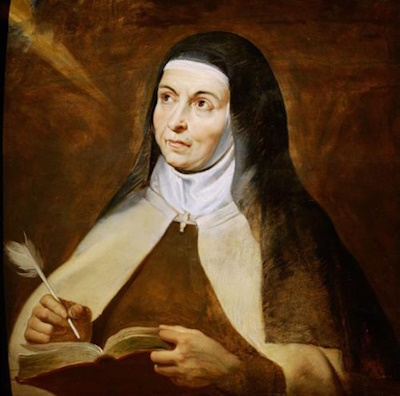
Teacher of the Faith by Peter Paul Rubens
The 16th century brought the Catholic Reformation and important reform in the religious orders to which Teresa of Avila made an outstanding contribution, becoming a founder of a reformed order of Carmelites.
Born to an aristocratic Castilian family, she was sent to Augustinian nuns to be educated. Devout from a young age, she still developed a teenage interest in fashion and romance. But, after reading Jerome’s letters during a convalescence, she decided to become a nun and joined the Carmelite Convent of the Incarnation. The convent was liberal and luxurious, but Teresa committed herself to deepening her prayer life, impressing the other nuns and visitors with her charm. As her prayer life deepened, she experienced visions and a conversion identifying herself with Augustine and Mary Magdalene.
Her concern for strict observance of the primitive Carmelite rule brought her much opposition and ridicule from Church authorities. In 1562 she founded the convent of St Joseph at Avila, the first of 16 during her lifetime. She had taken the name Teresa of Jesus but became universally known as Teresa of Avila, from the location of the house.
The austere way of life in the convent was characterised by personal poverty, manual work and enclosure. Teresa insisted her nuns must be intelligent and have good judgment saying, “God preserve us from stupid nuns!”. She shared in the menial tasks, and proved to be a leader of strong character, common sense, and considerable shrewdness.
In the late 1560s, she worked with St John of the Cross in the reform of the Carmelite Friars, setting out to change the laxity of the order. Facing the same opposition as with the reformed Carmelite convents. Teresa returned as prioress to the Convent of the Incarnation in 1571, and for 5 years John was confessor to the convent. It is generally accepted that he owed much of his understanding of the spiritual life to Teresa.
Teresa wrote extensively on the spiritual life, her spiritual autobiography, written at the request of her confessors, was an early work. Followed by a book of instruction for her nuns, 'The Way of Perfection', and 'Foundations' a lively account of the various houses she established. The best work is 'The Interior Castle', in which she became the first writer on the spiritual life to offer a meticulous description of the stages of spiritual development, from meditation to the so-called mystical marriage. In 1970 her writings finally led to recognition of her importance as she became the first woman to be named a doctor of the church.
BORN: 28 March 1515, Ávila, Crown of Castile (Spain)
DIED: 4 October 1582 (aged 67), Alba de Tormes, Salamanca, Spain.
 Welcome
Welcome Calendar
Calendar Today's Word
Today's Word Lauds
Lauds Terce
Terce Sext
Sext None
None Vespers
Vespers Compline
Compline Matins
Matins